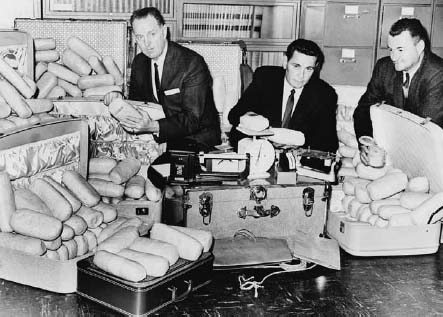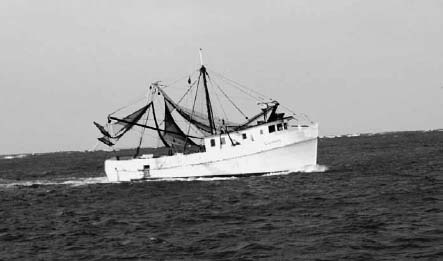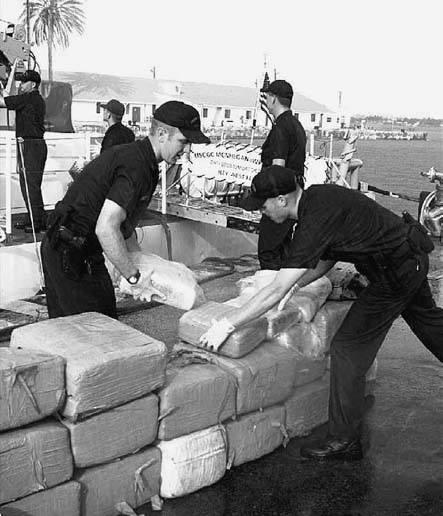
Seven
THE POT HAULERS
Marijuana’s lethargic effects were known long before the Spanish came to Florida. The famous Native American “peace pipe” was probably stuffed with dried cannabis leaves. Queen Victoria of Britain used it to ease her menstrual cramps; jazz trumpeter Louis Armstrong was a lifelong marijuana fan, as was astronomer Carl Sagan. Marijuana was once legal in the United States; grocers sold it in bulk and newsstands sold it in small bags with cigarette papers attached.
The Federal Marijuana Tax Act of 1937 put an end to legal cannabis. Four years after the alcohol Prohibition ended, the Marijuana Prohibition began. Sale and consumption went underground and use of the drug rose sharply in the 1960s, as younger Americans in the counterculture experimented with it and enjoyed its effects. Confiscations of contraband rose.
In hindsight, the quantity of seizures in the late 1960s seems puny. In fiscal year 1965–66, 10,000 pounds of marijuana were seized by customs and drug agents in the United States. In 1966–67, the amount grew to 26,000 pounds and in 1967–68 seizures reached 70,000 pounds. With its vast coastline, Florida was perfectly poised to supply the growing demand for marijuana in the 1970s. While no coastal area was exempt, the best-documented cases occurred along the sugar-sand and mangrove choked western shores.
Commercial fishermen had fallen on hard times and found they could earn more in a day offloading a mother ship full of pot than they could in a year of backbreaking honest labor. In the beginning, it was a family-and-friends affair. Word would be spread that “a load” was coming and fishermen would quietly slip into their small boats for a midnight rendezvous. The scene could be comical, as Totch Brown describes in his autobiography, My Life in the Everglades: “Most every crewman was new at pot-hauling, like myself, and the boats we used were too small and were overloaded. Several sank; others were leaky and the pot got wet. Above all, bad weather brought in the tidewater higher than normal and soaked some of what we’d stashed away.”

This represented a huge marijuana bust in 1963, with newspaper mentions across the country. A decade later, it’s doubtful this size of seizure would rate any mention at all. Consumption and demand soared in the 1960s and 1970s. Eventually hundreds of tons of marijuana were confiscated and millions more tons were smuggled successfully. Courtesy Library of Congress.
The story of Florida’s homegrown pot smugglers first emerged publicly when a shrimp boat ran aground near Steinhatchee in the Big Bend area in 1973. John Rothchild returned to the area a decade later to write about what happened next (from the January 1983 edition of Harper’s Monthly):
The first time any of the local fishermen saw a bale, or even a stalk, was after one of Floyd Bubba Capo’s boats ran aground on a shoal in nearby Rocky Creek in 1973. J. Bryant Lytle saw the bales from his own boat. ‘I didn’t know what the shit it was,’ he said. ‘I thought it was some kind of bayonet trees from over on Pepperfish Island.’ (Lytle himself went to jail for the Watermelon Truck Stop deal). Another fisherman took a sample from one of the bales over to the sheriff’s department, where then deputy Glen Dyals, now the head sheriff and under considerable suspicion himself, suggested that he thought it was marijuana and his department could take some credit for the nine-ton bust, the biggest in U.S. history up to then. The case was taken over by the Florida Department of Law Enforcement and prosecuted out of the area for reasons that will soon be apparent. Those arrested in the bust were called the Steinhatchee Seven, a prophetic misnomer. Six of them were middle-class kids from St. Petersburg, and the seventh was [Floyd Bubba] Capo, who lived down at Horseshoe Beach, 15 miles away. In 1973, most of the regular Steinhatchee fishermen bristled at the headlines that connected them with drug smugglers, just because a boat happened to end up in one of their creeks. By 1976, Capo was the fisherman everybody wanted to emulate. As his business flourished, he donated money for crippled children, needy families and civic organizations, and he even built his wife a church near Horseshoe Beach.

When Florida’s pot haulers talk about a shrimp boat, this is the craft to which they refer. Economical to operate and cheap to buy with substantial cargo capacity and good sea keeping qualities—they were perfect for Florida’s west coast pot haulers. They are still common along the Gulf Coast. Courtesy National Oceanic and Atmospheric Administration.
For a hand-to-mouth fisherman, the proceeds were astounding. One night’s work offloading bales and bringing them ashore netted $10,000. The largesse, according to court records, didn’t stop at the fishermen. A county deputy sheriff could receive $20,000 for simply staying away. And for the mastermind executive who put the deal together, one load was worth $500,000 profit.
Floyd Bubba Capo was not a Steinhatchee native. He hailed from the fishing village of Cortez, Florida. That tightly knit community too was involved in the trade of pot hauling. Ben Green’s exploration of Cortezian history (Finest Kind: A Celebration of a Florida Fishing Village) devotes an entire chapter to pot smuggling, with a focus on one man—Raymond Luther Guthrie Jr., better known as “Junior.”
Junior Guthrie was described by the Sarasota Herald-Tribune as “a fearless, powerfully built man and Robin Hood-style character in many smuggling legends of Southwest Florida.” The only legends Junior is associated with in Cortez have to do with how many grades he flunked in school and the stupid dares that he was always willing to take as a kid. If you wanted to challenge somebody to dive headfirst off the roof of the dock at low tide, Junior was your boy. The only thing that Junior was ever good at, and he was very good at that, was catching fish. And as the testimony unfolded about his smuggling career—bungled attempts, shortchanged payments, mechanical failures—one could argue that fishing was still the only thing he did well.
At the age of thirty-four, Junior was charged with importing 246,000 pounds of marijuana, valued at $23 million. His trial opened in Tallahassee Federal Court on August 22, 1983. Big drug trials were commonplace in Florida at the time. Excluding the lawyers, bailiffs, clerks, judge and defendants, only four people were present: Junior’s mother and father and two reporters for Junior’s hometown papers, the Bradenton Herald and the Sarasota Herald-Tribune.
The majority of Cortezians were not smugglers. But they knew what was happening. “The smuggling was a silent backdrop to their lives,” wrote Green. “They heard the boats coming in at odd hours, saw the new vans and Lincoln continentals parked in front of Junior’s house, and gazed suspiciously at the burned-out derelicts who descended on Cortez like locusts, hoping to get a job on a fishing boat and get in on a few runs.”
The new wealth could not be concealed. Old fishermen’s shacks along the west coast sported new porches and new vans were parked in new garages. New boats, new motors, new clothes, gold jewelry, all on a $10,000 fisherman’s income. But because many of these men and women lived in small fishing villages like Cortez, Steinhatchee and Everglades City, the sudden wealth was mostly invisible. To the fishing families, it seemed a long-overdue bonanza, a payoff for decades of hard and dangerous toil on the water.
But as the circle of wealth began to spread, so did the circle of corruption. John Rothchild at this time lived in Everglades City and described a pretrial gathering in his book, Up For Grabs.
The night before he went to trial, [Richard] Wolferts gave a huge party, attended by more than half the town, including all the local deputies and a majority of the local smugglers. He dressed up in a black-and-white convict suit and seemed to be in a great humor, on the wall near the serving line for the barbecued wild hog he put up a wooden plaque, the kind used in mounting stuffed fish, but his prized catch was a burlap bale. Deputies and smugglers danced and reveled for hours in suspicious togetherness.
The mechanics of the trade were simple. An organizer (“the key man”) would travel to Colombia and arrange for the supply of marijuana. A trusted local contact would remain to ensure the burlap-covered bales actually contained cannabis and not banana leaves or other trash.
Then the organizer would arrange for a commercial shrimp boat or small freighter to arrive at a small port in northern Colombia, load the bales and steam north to Florida. There, small boats would come out from the coast, load up and return to put the pot in hideouts. Later trucks would come to pick up the load. Sometimes the load would be sold in bulk and sometimes it would be parceled out.
Totch Brown admits to participating in eight smuggling events, starting as a simple pot hauler with a small boat and ending as a major organizer. Here he describes his seventh operation.
Nine days later, right on schedule, she made her rendezvous off the Florida coast. This business hardly ever turns out like it’s planned, and this being my first shot at buying and selling, it turned out bad. First off, those crooks only gave my crew about half a load, and like most always, at least have [sic] of that was junk. I do believe they packed in everything from dried banana leaves to seaweed with that marijuana. The first buyer I tried turned it down flat. The second buyer stole what he got—and never paid me a dime. The next truckload never even made it to the buyer; the boys in the warehouse ripped me off. Finally, though, before losing it all, I made a cash sale big enough to put me back on my feet and give me time to look around a little.
Totch, like so many of his pot-hauling colleagues, eventually was arrested. In his case, it was for income tax evasion. Rothchild wrote, “Totch, who lived in a small cottage on Chokoloskee Island, eventually showed up in federal court in Miami to answer an IRS complaint about having falsified his taxable income, and with his gnarled hands, the [Miami] Herald reported, he produced a cashier’s check for more than $1 million, and offered up a similar amount in property in the hope it would settle his little debt to the government.”
Junior too got a call from the tax man. “When the Internal Revenue Service filed suit against him in March 1982 for $483,220 in back taxes on unreported income, it looked as though Junior might fall victim to the same fate as Al Capone,” Green wrote. “When Junior paid them the money, thinking that would shut them up, the IRS immediately wanted to know how he got the money to pay it. Discretion in spending money was never one of Junior’s strong suits.” The Sarasota Herald-Tribune reported on August 31, 1983, that Junior’s net worth in 1980 was $1.7 million, up from $47,392 in 1976. As Green might say, “That’s a lot of fish.”
Eventually it all fell apart. Totch, Bubba and Junior all ended up in the slammer, along with a lot of other, seemingly more respectable folks. “Smuggling in Manatee County had become so rampant by 1980 that a state grand jury was convened in Bradenton in July of that year. It began investigating politicians, law enforcement officers and financiers with possible smuggling connections,” Green wrote. “Several prominent figures were eventually indicted, including Jerome Pratt, an attorney and former state legislator, and Afton Pyles, a former Palmetto police lieutenant.”
Before Brown was sentenced, the Miami Herald ran an editorial in his defense, saying: “How do you sentence a man like Totch Brown? A veteran of the Battle of the Bulge, a Bronze Star winner, with nearly fifty years of close family ties, who handed out thousands of dollars to his neighbors in need and never in serious trouble before.”
Totch spent fifteen months in federal prison. It was time well served because it was the genesis of his marvelous autobiography of growing up and living in the Ten Thousand Islands. He was a living link among the plume hunters, rumrunners, gator skinners and pot haulers who form one leg of the maritime history of Florida.
Once again, some of the proceeds from the smuggling trade ended up in real estate, as Totch’s settlement offer indicates. The 1970s was the beginning of the condominium era for the Florida west coast. When you look at the beachfront skyline today, you realize the proceeds from pot hauling laid many of their foundations.
“Marijuana and commercial fishing were the only two local businesses not controlled by outside corporate forces,” wrote Rothchild in Harper’s. “Both were father-and-son efforts, both required similar skills and even similar hours; but with marijuana you could work once a year. There was friendliness and neighborliness on the job. In fact, the small-town ethic still defined the smuggling.” But not for long.
In the late 1970s, the American farmer out of desperation rediscovered marijuana; by the mid-1980s, domestic cannabis production began to undercut the Colombian product in price and quality. In some areas of the United States, the Department of Agriculture indicated pot was the top cash crop. The profitability of smuggling it from Colombia declined, just as the risks of getting caught began to escalate. Marijuana smuggling required too many large assets: boats, trucks, offloading crews, warehouses and all those bales.
As the 1970s came to a close, a new breed of smuggler began to emerge. The Totch Browns, Junior Guthries, Bubba Capos and their fishermen friends were pushed aside by a tougher crowd. The illegal drug of choice was changing and the smuggling market adapted swiftly.
Marijuana hasn’t gone away. In 2003, more than 2.5 million tons of marijuana was seized in the southwestern United States. It is no longer a mom and pop business and the days of misadventure have given way to corporate-like efficiency. Florida as a port of entry for pot is enjoying a resurgence. The National Drug Threat Assessment 2005 says:
The South Florida area remains a primary entry point for foreign-produced marijuana smuggled through the Caribbean and is emerging as a regional source of supply for domestic marijuana. Law enforcement reporting and seizure data indicate that Florida, particularly the southern portion of the state, continues to be a focal point for maritime smuggling of marijuana from source areas such as Colombia and Jamaica. But in the past few years, as seizures specifically at the port of Miami have declined, reporting indicates that shipments are entering Florida at various points along the state’s Atlantic Coast, particularly from Miami to Port St. Lucie, and at the southern tip.
In the early 1980s, a vastly overweight man named Ed Chance was elected to the Manatee County Commission. His primary trade was barbering. He sang country and western songs on the weekends. One day I spied a guitar in the corner of his office. “Do you play?” I asked naïvely.
“Well, sure,” said Chance. He picked up that guitar and sang “The Ballad of Junior Guthrie.” Then he told me the time somebody put a brown grocery bag full of high-denomination bills on the front steps of the Manatee County Sheriff’s Office. “A donation from the Manatee County smugglers,” the note said.

Marijuana never disappeared from the smuggling scene, although the trade shifted dramatically to the southwestern border in the late 1990s. But Florida continued to haul its share. Here two “coasties” from the cutter Monhegan stack “square grouper” on the dock at Key West in 2001. Courtesy U.S. Coast Guard.
On Florida’s west coast, from Everglades City to Steinhatchee, the pot haulers remained part of their communities. They built churches, donated money quietly, didn’t hurt anybody and—for the most part—faded into the general population when the game was over. A few were busted, but many more emerged unscathed to invest their profits wisely and well.